Ever wondered why snake plants have become the darlings of indoor gardening? You’ll find these resilient beauties in an impressive array of varieties, each with distinct patterns and growth habits. From the silvery sheen of Moonshine to the powerful presence of Black Gold, these low-maintenance plants offer unique characteristics that’ll transform your space. Whether you’re seeking a statement piece or a subtle accent, there’s a snake plant variety that’ll match your style perfectly.
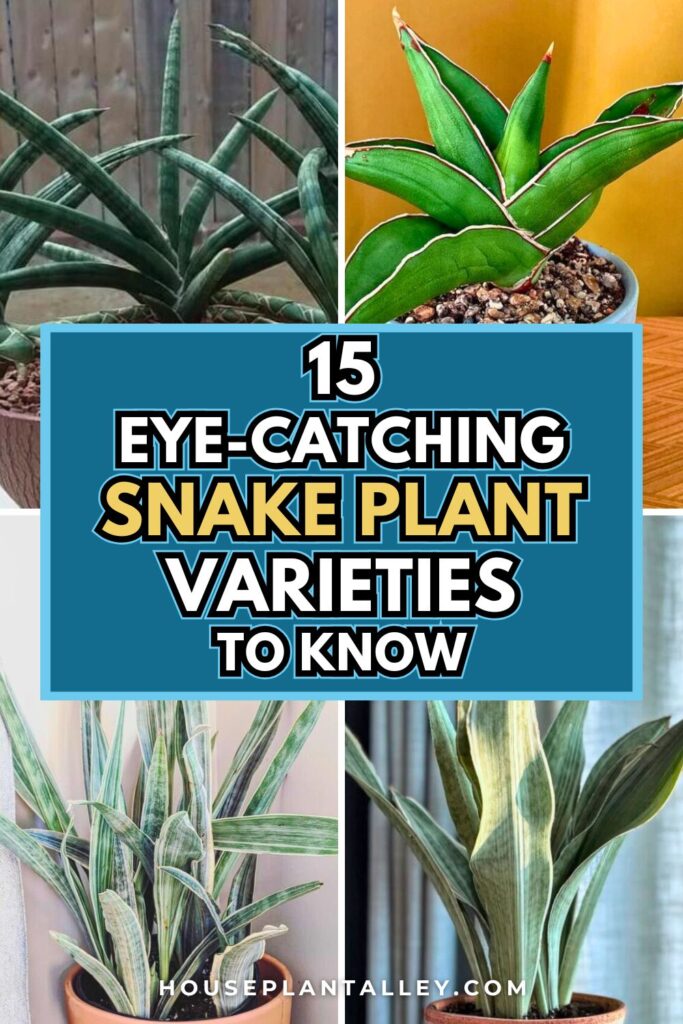
Contents
- 1 1. Golden Bird’s Nest Sansevieria
- 2 2. Cylindrical Snake Plant
- 3 3. Moonshine Snake Plant
- 4 4. Whale Fin Snake Plant
- 5 5. Twisted Sister Snake Plant
- 6 6. Black Gold Snake Plant
- 7 7. Starfish Snake Plant
- 8 8. Silver Queen Snake Plant
- 9 9. Blue Leaf Snake Plant
- 10 10. Dwarf Spear Snake Plant
- 11 11. Spotted Snake Plant
- 12 12. Sansevieria trifasciata ‘Bantel’s Sensation’
- 13 13. Sansevieria ‘Sayuri’
- 14 14. Sansevieria ehrenbergii ‘Samurai’
- 15 15. Sansevieria kirkii ‘Silver Blue’
1. Golden Bird’s Nest Sansevieria
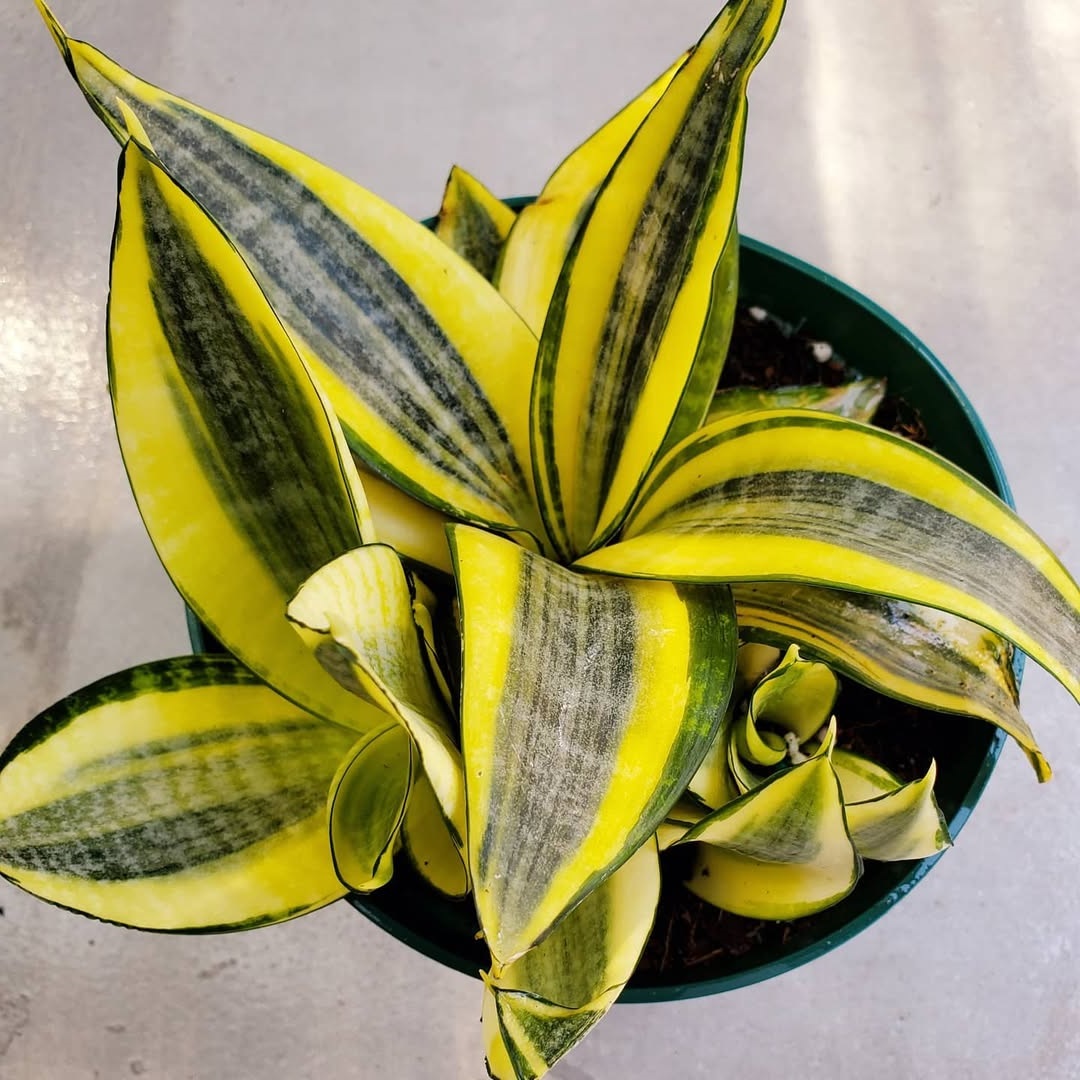
The Golden Bird’s Nest Sansevieria (Sansevieria trifasciata ‘Golden Hahnii’) is a compact, rosette-forming snake plant variety characterized by its short, wide leaves arranged in a nest-like formation. The leaves display beautiful golden-yellow variegated margins against a dark green center, making it an attractive choice for small spaces and container gardens. Unlike taller snake plant varieties, this dwarf cultivar typically grows only 4-6 inches tall, making it perfect for windowsills, desks, and tabletops.
- Light: Tolerates low light but thrives in bright, indirect sunlight; avoid direct sun which can scorch leaves
- Water: Allow soil to dry completely between waterings; water less frequently in winter
- Soil: Well-draining potting mix; preferably cactus or succulent soil
- Temperature: 60-85°F (15-29°C)
- Humidity: Adaptable to most indoor humidity levels
- Container: Small pot with drainage holes
- Fertilizer: Light feeding with balanced fertilizer during growing season
- Propagation: Division of rosettes or leaf cuttings
2. Cylindrical Snake Plant
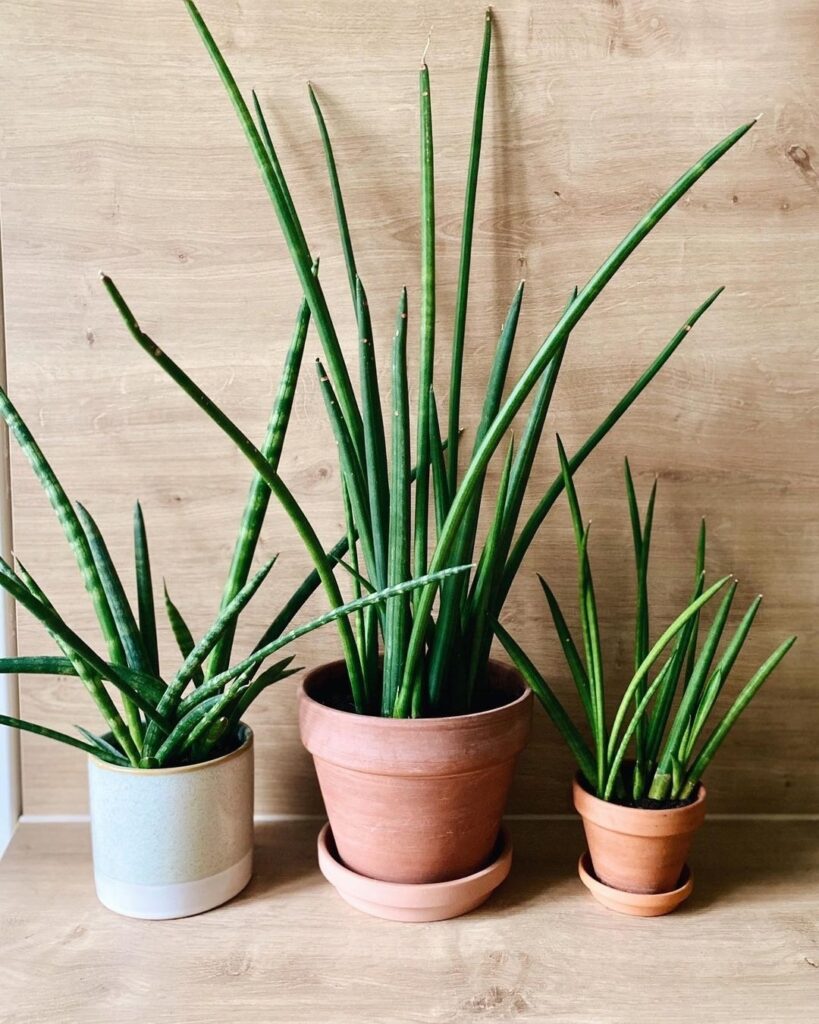
The Cylindrical Snake Plant (Sansevieria cylindrica) is a unique variety characterized by its round, spear-like leaves that grow upright in a fan pattern. Unlike the flat leaves of common snake plants, these cylindrical leaves are thick, smooth, and can grow up to several feet tall. The leaves feature subtle horizontal bands in varying shades of green and may develop a slight blueish tinge. This architectural plant is also known as the African Spear Plant or Skyline Spear Sansevieria and is popular in modern interior design for its striking appearance and low maintenance requirements.
- Light: Bright indirect light to partial sun; can tolerate low light but grows best in well-lit conditions
- Water: Allow soil to dry completely between waterings; water sparingly in winter
- Soil: Well-draining, sandy soil mix
- Temperature: 60-85°F (15-29°C)
- Humidity: Adaptable to most humidity levels; prefers average home humidity
- Fertilizer: Light feeding with balanced fertilizer during growing season
- Propagation: Division of rhizomes or leaf cuttings
- Container: Pot with drainage holes; prefers to be slightly root-bound
3. Moonshine Snake Plant
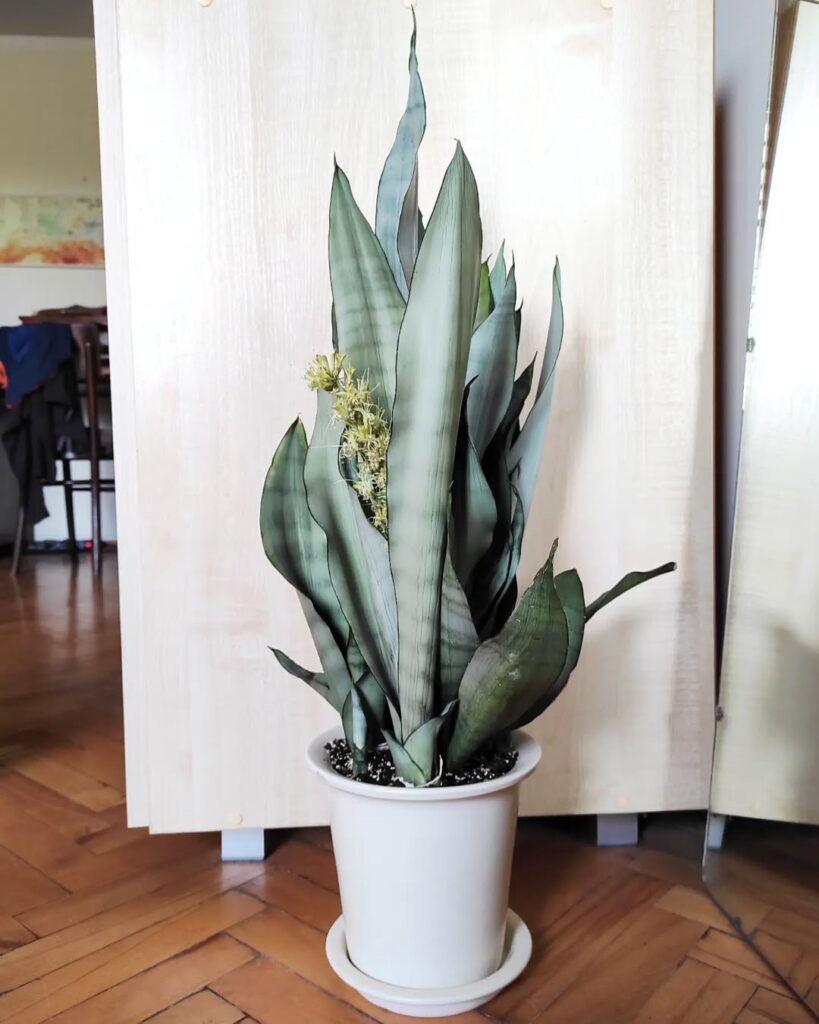
The Moonshine Snake Plant (Sansevieria trifasciata ‘Moonshine’) is a striking variety known for its wide, silvery-gray leaves with subtle green undertones. This cultivar grows in an upright, architectural form reaching heights of 12-24 inches tall. The pale, ethereal coloring makes it a standout choice for modern interior spaces, while still maintaining the hardy, low-maintenance characteristics that snake plants are famous for.
- Light: Thrives in bright indirect light but tolerates low light; avoid direct sunlight which can fade the silvery coloring
- Water: Allow soil to dry completely between waterings; water less frequently in winter
- Soil: Well-draining potting mix; preferably a cactus or succulent blend
- Temperature: Comfortable in average room temperatures between 65-85°F (18-29°C)
- Humidity: Adaptable to any humidity level; no special requirements
- Fertilizer: Light feeding with balanced fertilizer during growing season
- Pot Requirements: Container with drainage holes; prefer being slightly root-bound
4. Whale Fin Snake Plant
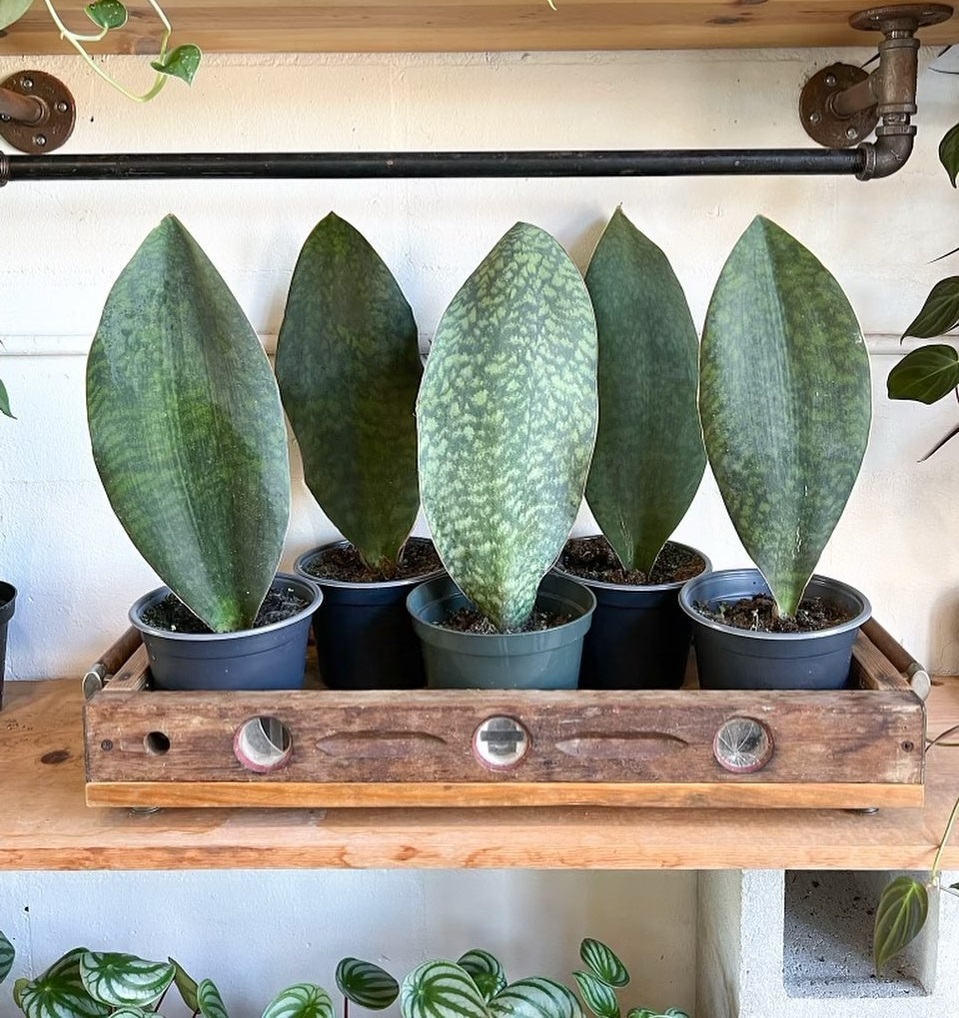
The Whale Fin Snake Plant (Dracaena masoniana) is a unique variety of snake plant characterized by its distinctive wide, paddle-shaped leaves that resemble a whale’s fin. Each leaf can grow up to 4 feet tall and 12 inches wide, making it one of the largest snake plant varieties. The leaves are thick and sturdy with a mottled pattern of dark and light green, sometimes featuring silver-gray striations. Unlike other snake plants that grow in clusters, the Whale Fin typically produces single leaves from its rhizome.
- Light: Tolerates low light but thrives in bright, indirect light; avoid direct sunlight which can scorch leaves
- Water: Allow soil to dry completely between waterings; water less frequently in winter
- Soil: Well-draining potting mix; preferably a mixture of regular potting soil with sand or perlite
- Temperature: Prefers 60-85°F (15-29°C)
- Humidity: Adaptable to various humidity levels; does well in normal household conditions
- Fertilizer: Light feeding with balanced fertilizer during growing season (spring and summer)
- Pot Type: Container with drainage holes to prevent root rot
5. Twisted Sister Snake Plant
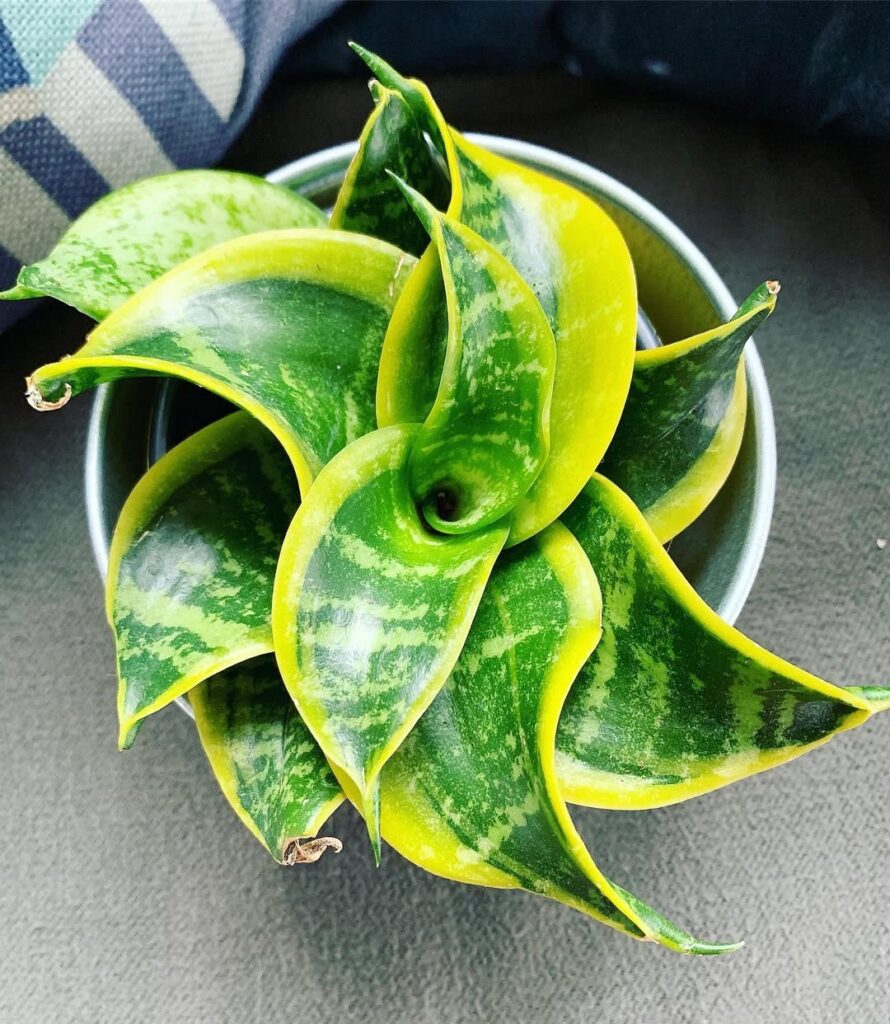
The Twisted Sister Snake Plant (Sansevieria trifasciata ‘Twist’) is a compact and visually striking variety of snake plant characterized by its uniquely contorted leaves that grow in a spiral pattern. The leaves are variegated with bands of light and dark green, growing to about 15 inches tall, making it smaller than many other snake plant varieties. This dwarf cultivar maintains the same tough, hardy nature of traditional snake plants while offering an interesting architectural element to indoor spaces with its twisted, curling foliage.
- Light: Tolerates low to bright indirect light; avoid direct sunlight which can scorch leaves
- Water: Allow soil to dry completely between waterings; water less frequently in winter
- Soil: Well-draining potting mix; prefers slightly sandy soil
- Temperature: Thrives in 65-85°F (18-29°C)
- Humidity: Adaptable to most indoor humidity levels
- Fertilizer: Light feeding with balanced fertilizer during growing season
- Container: Pot with drainage holes to prevent root rot
- Propagation: Division of rhizomes or leaf cuttings
6. Black Gold Snake Plant
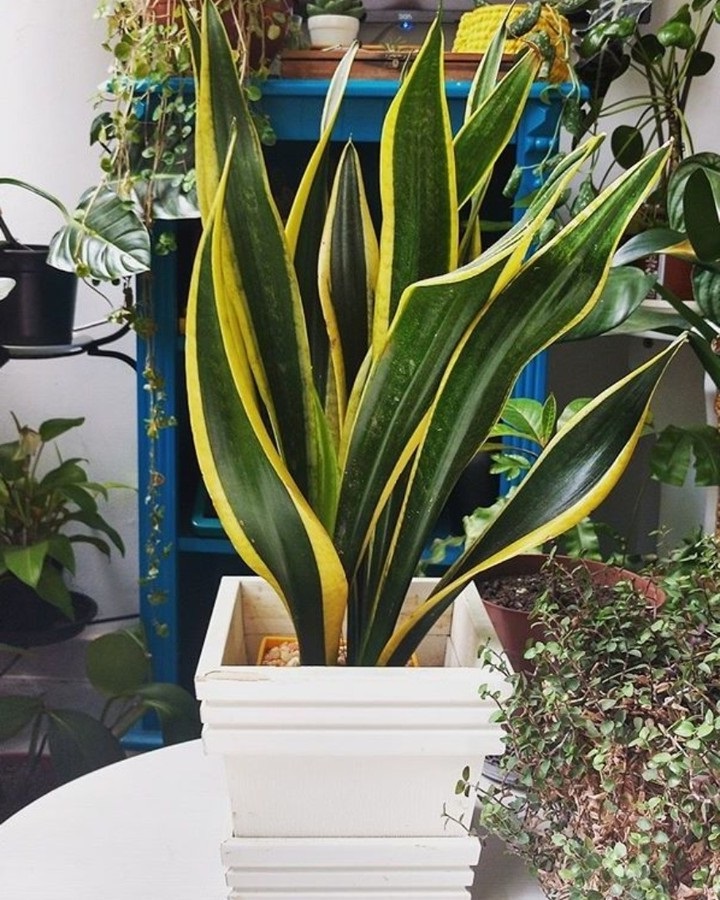
The Black Gold Snake Plant (Sansevieria trifasciata ‘Black Gold’) is a striking variety characterized by its dark green leaves with golden yellow edges. This cultivar grows in an upright, architectural pattern with sword-like leaves that can reach heights of 2-3 feet tall. The contrast between the deep green center and bright margins creates a dramatic appearance, making it a popular choice for modern interior spaces and low-light environments.
- Light: Tolerates low to bright indirect light; avoid direct sunlight which can fade the variegation
- Water: Allow soil to dry between waterings; water sparingly in winter
- Soil: Well-draining potting mix; prefers slightly sandy soil
- Temperature: 60-85°F (15-29°C)
- Humidity: Adaptable to various humidity levels
- Fertilizer: Light feeding with balanced fertilizer during growing season
- Propagation: Division of rhizomes or leaf cuttings
- Container: Pot with drainage holes; prefers to be slightly root-bound
7. Starfish Snake Plant
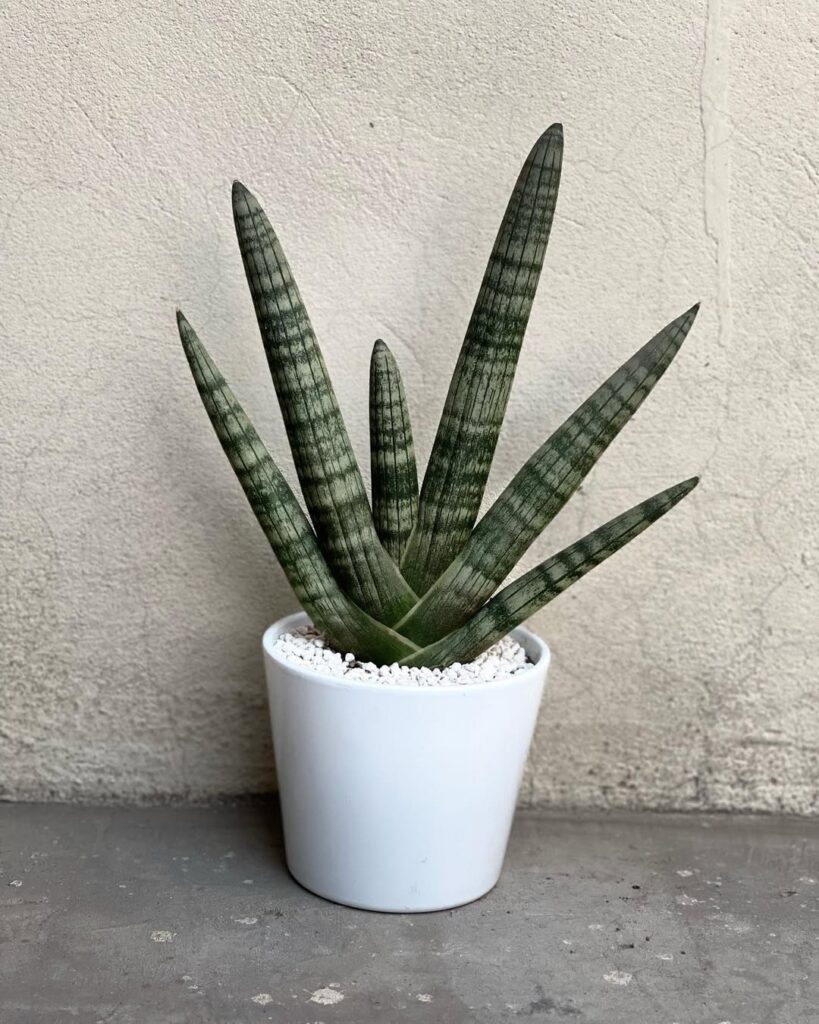
The Starfish Snake Plant (Sansevieria cylindrica ‘Boncel’) is a unique variety featuring cylindrical, finger-like leaves that grow in a fan pattern resembling a starfish when viewed from above. Each leaf is round, pointed at the tip, and grows up to 2-3 feet tall. The leaves have a smooth texture and display subtle horizontal gray-green bands along their length. This compact succulent is perfect for modern interior spaces and makes an excellent houseplant due to its architectural form and low maintenance requirements.
- Light: Bright indirect light to partial shade; can tolerate some direct sunlight
- Water: Allow soil to dry completely between waterings; water less in winter
- Soil: Well-draining succulent or cactus mix
- Temperature: 60-85°F (15-29°C)
- Humidity: Tolerates low humidity levels
- Fertilizer: Light feeding with balanced fertilizer during growing season
- Container: Pot with drainage holes; preferably terracotta or clay
- Propagation: Division of rhizomes or leaf cuttings
8. Silver Queen Snake Plant
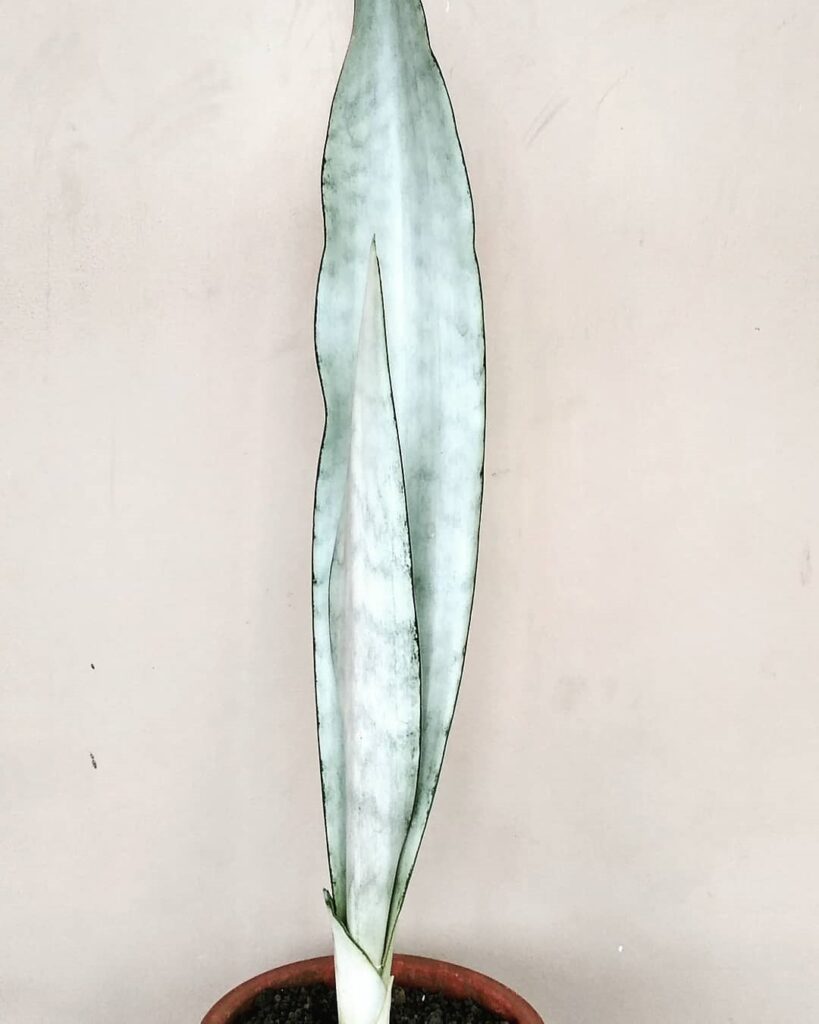
The Silver Queen Snake Plant (Sansevieria trifasciata ‘Silver Queen’) is a striking variety characterized by its silvery-green, vertical leaves with subtle pale green striping. This elegant cultivar typically grows 2-3 feet tall and features stiff, upright leaves that are lighter in color than the common snake plant. The plant’s silvery coloration comes from a waxy coating on its leaves, which also helps protect it from moisture loss and gives it an attractive, almost metallic sheen.
- Light: Tolerates low light but thrives in bright, indirect sunlight; avoid direct sun which can scorch leaves
- Water: Allow soil to dry completely between waterings; water less in winter; highly drought-tolerant
- Soil: Well-draining, sandy potting mix
- Temperature: 60-85°F (15-29°C)
- Humidity: Adaptable to most humidity levels; prefers average home humidity
- Fertilizer: Light feeding with balanced fertilizer during growing season
- Container: Pot with drainage holes to prevent root rot
- Growth Rate: Slow to moderate growth rate
9. Blue Leaf Snake Plant
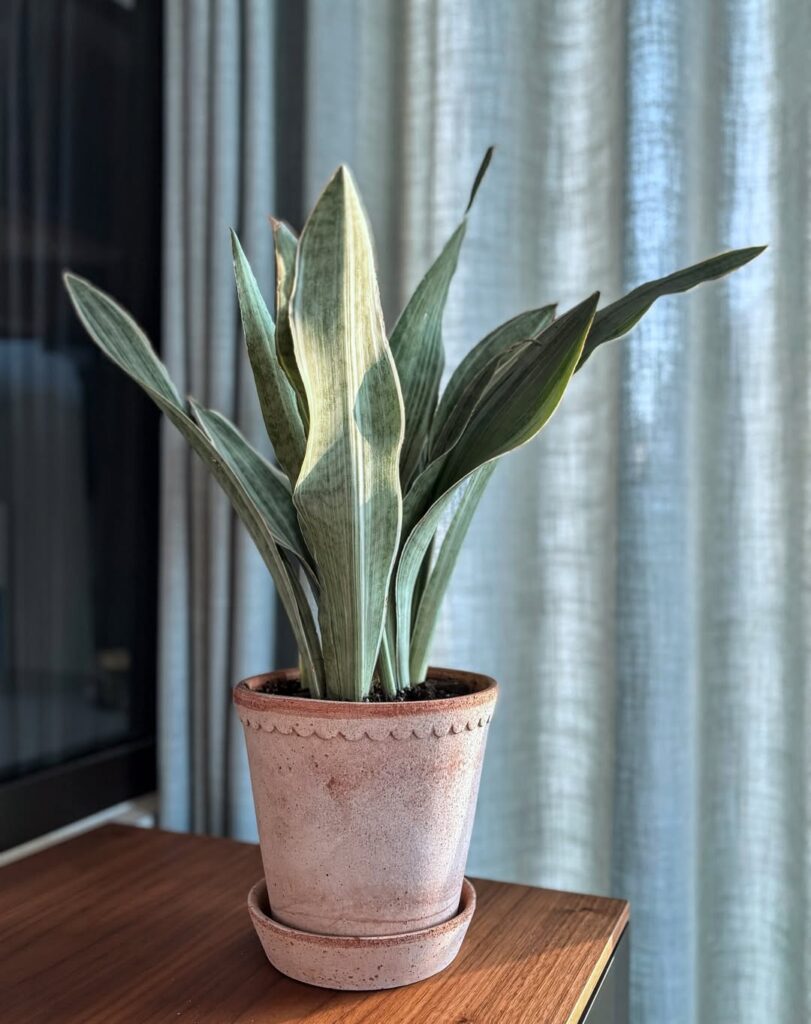
The Blue Leaf Snake Plant (Sansevieria metallica) is a striking variety known for its distinctive blue-green to silvery-blue coloring and metallic sheen. This medium-sized snake plant features thick, sword-shaped leaves that grow in an upright pattern, typically reaching heights of 2-3 feet. The leaves have a smooth texture and maintain their distinctive coloring throughout their lifespan, making it an attractive choice for both indoor and outdoor cultivation in suitable climates.
- Light: Tolerates various light conditions but thrives in bright, indirect light; can handle some direct sun but may fade in intense exposure
- Water: Drought-tolerant; water only when top 2 inches of soil is completely dry
- Soil: Well-draining, sandy potting mix
- Temperature: 60-85°F (15-29°C)
- Humidity: Adaptable to various humidity levels; prefers moderate humidity
- Fertilizer: Light feeding with balanced fertilizer during growing season
- Pot Requirements: Container with drainage holes; prefers to be slightly root-bound
10. Dwarf Spear Snake Plant
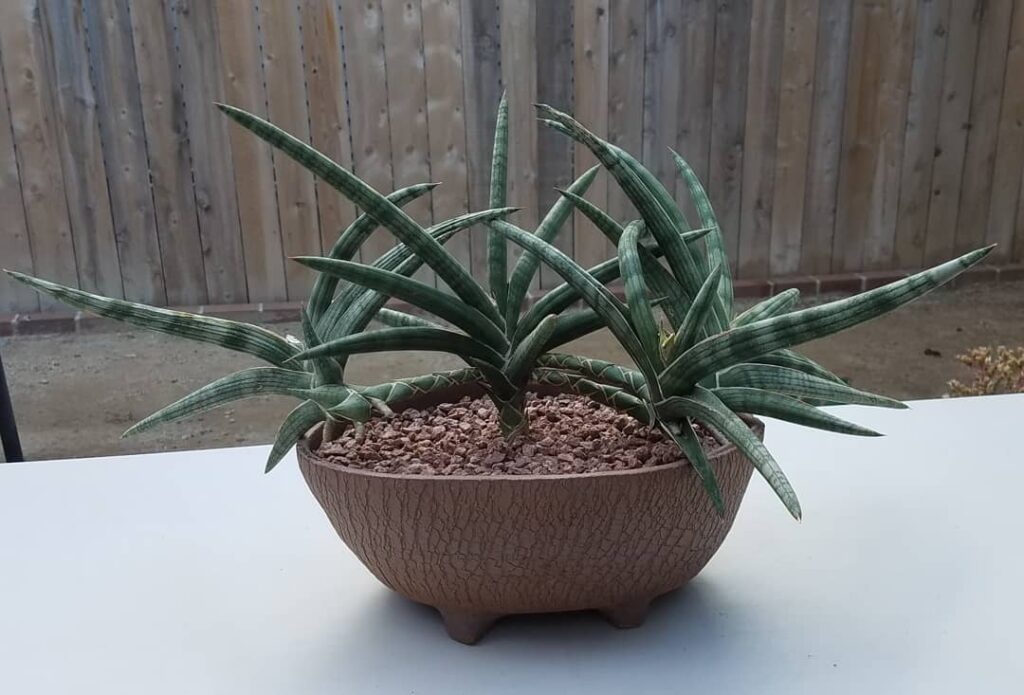
The Dwarf Spear Snake Plant (Sansevieria suffruticosa) is a compact variety of snake plant characterized by its short, spear-like leaves that grow in tight rosettes. This miniature variety typically reaches only 6-12 inches in height, making it perfect for small spaces, desktops, and terrariums. Its leaves are dark green with subtle light green horizontal bands and maintain the characteristic stiffness of other snake plant varieties.
- Light: Tolerates low to bright indirect light; avoid direct sunlight
- Water: Allow soil to dry completely between waterings; water less in winter
- Soil: Well-draining potting mix with added perlite or sand
- Temperature: 60-85°F (15-29°C)
- Humidity: Adaptable to any humidity level
- Fertilizer: Light feeding with balanced fertilizer during growing season
- Pot: Small container with drainage holes
- Propagation: Division of rhizomes or leaf cuttings
11. Spotted Snake Plant
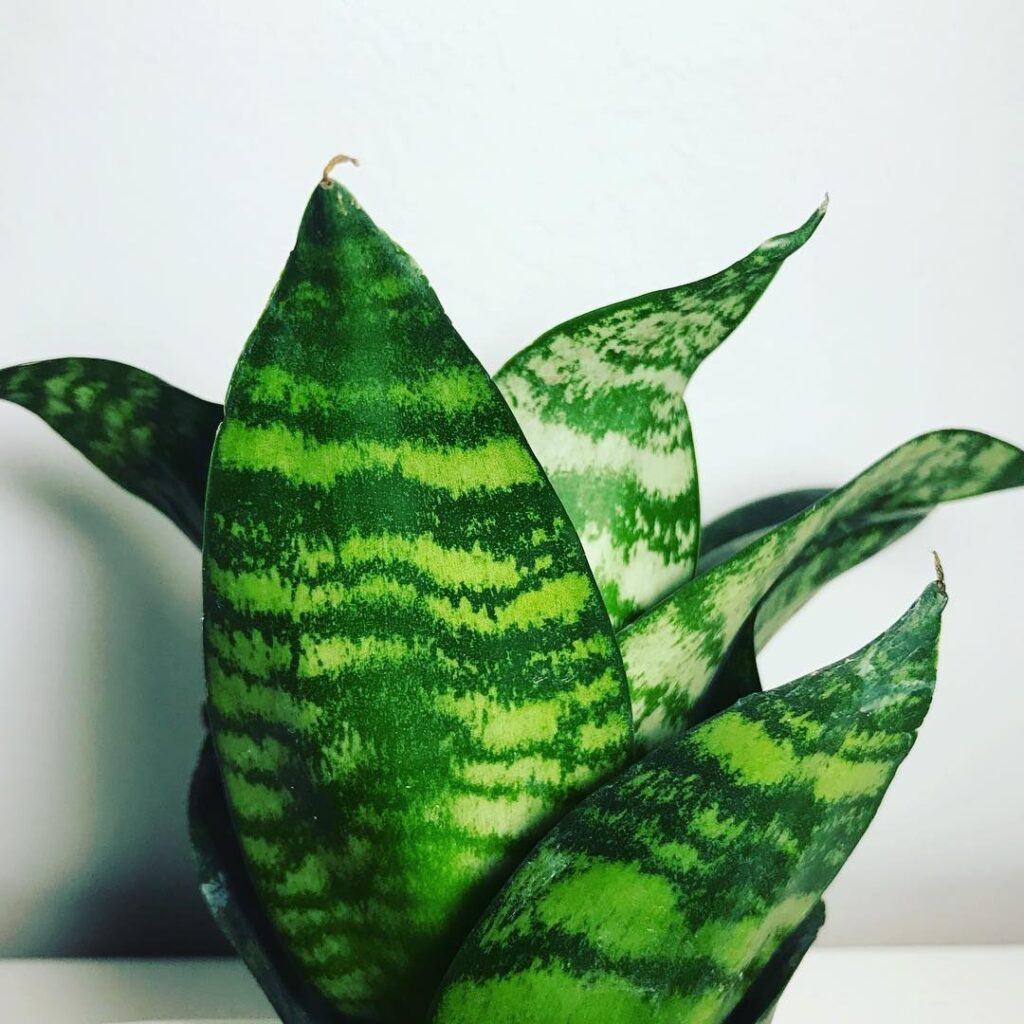
The Spotted Snake Plant (Sansevieria trifasciata ‘Hahnii’) is a compact variety of snake plant featuring distinctively mottled leaves with irregular dark green patches and silvery-green cross-banding patterns. This dwarf cultivar typically grows to about 6-8 inches tall, making it perfect for small spaces and desktop gardens. The leaves are arranged in a rosette pattern, growing outward from a central point, and maintain the characteristic thick, rigid structure common to all snake plants.
- Light: Tolerates low light but thrives in bright, indirect light; avoid direct sunlight which can scorch leaves
- Water: Allow soil to dry between waterings; water less frequently in winter
- Soil: Well-draining potting mix; preferably a cactus or succulent blend
- Temperature: 60-85°F (15-29°C)
- Humidity: Adaptable to most indoor humidity levels
- Fertilizer: Light feeding with balanced fertilizer during growing season
- Pot Requirements: Container with drainage holes; does well when slightly root-bound
12. Sansevieria trifasciata ‘Bantel’s Sensation’
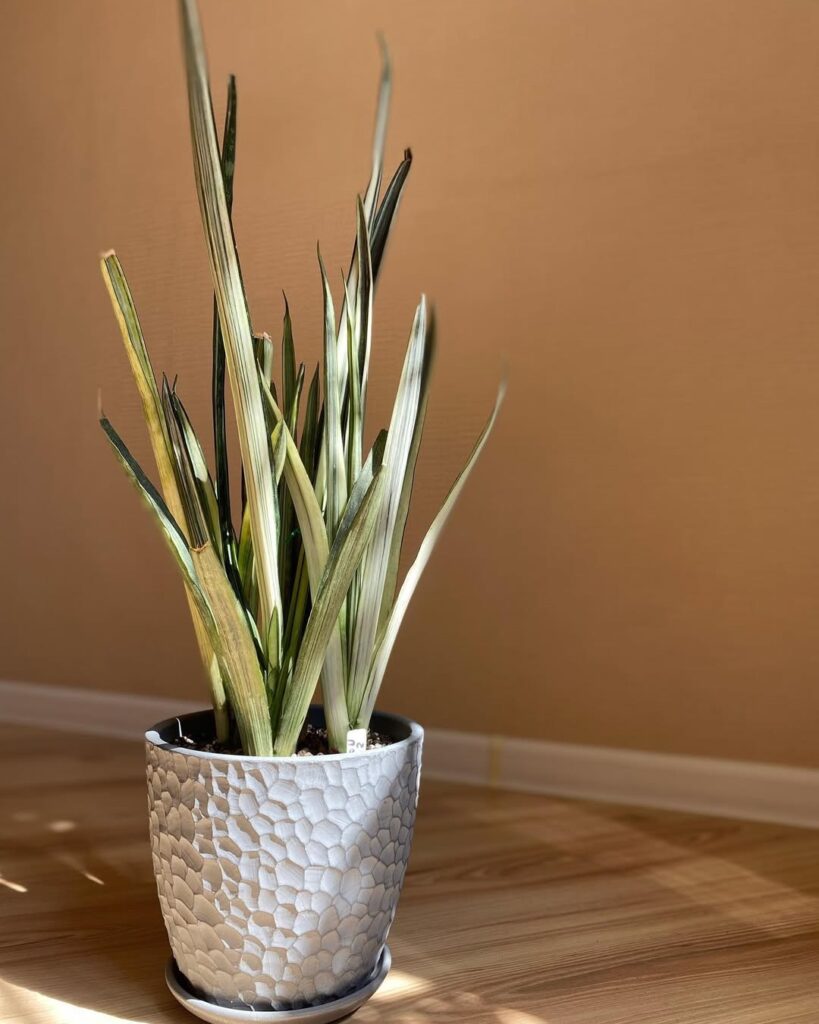
The Bantel’s Sensation snake plant is a rare and elegant variety known for its striking white vertical stripes on narrow, upright leaves. Its refined, architectural look makes it a stunning addition to any indoor space. Growing up to 24-30 inches tall, this variety maintains the resilience and low-maintenance appeal of traditional snake plants while offering a unique aesthetic.
- Light: Prefers bright, indirect light but tolerates low light conditions
- Water: Allow soil to dry completely between waterings; reduce watering in winter
- Soil: Well-draining mix with perlite or sand for aeration
- Temperature: 60-85°F (15-29°C)
- Humidity: Adaptable to various humidity levels
- Fertilizer: Occasional feeding with balanced fertilizer during growing season
- Pot: Medium container with drainage holes
- Propagation: Division of rhizomes or leaf cuttings
13. Sansevieria ‘Sayuri’
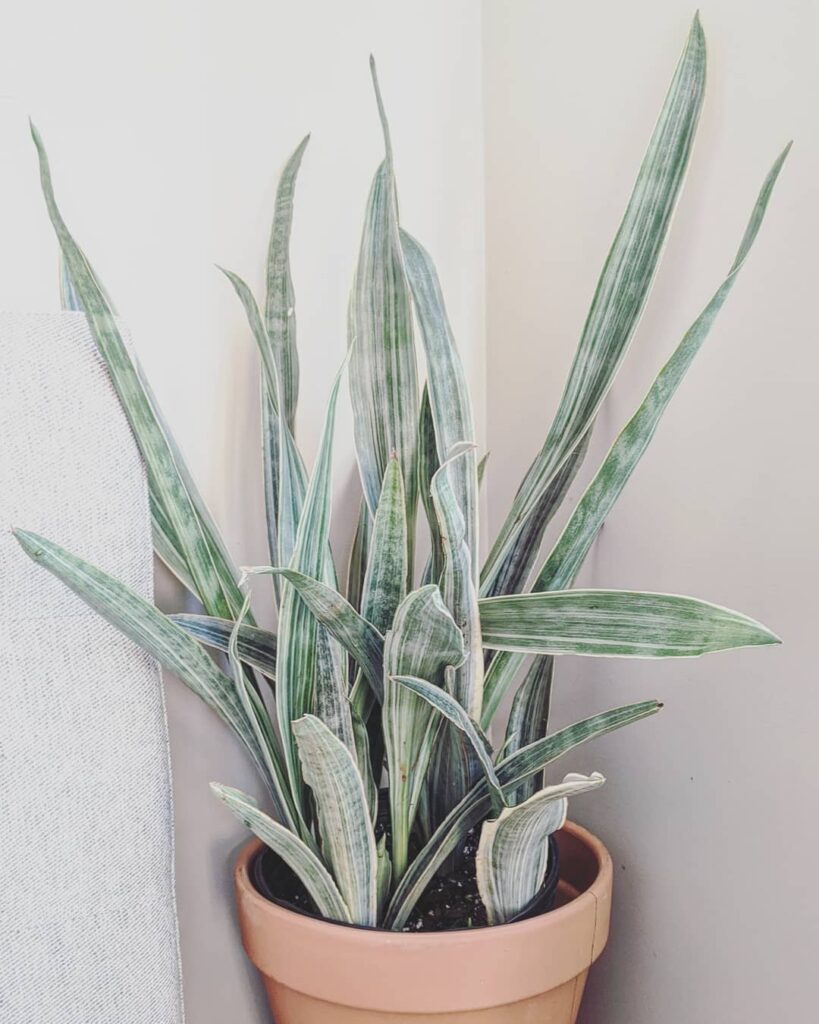
The Sayuri snake plant stands out with its soft, pale gray-green foliage accented by subtle silver streaks. This understated beauty brings a modern, calming vibe to any space, thriving in low-maintenance conditions. It grows in a sleek, upright form, reaching 24-36 inches tall, making it an excellent choice for minimalist or contemporary interiors.
- Light: Thrives in bright, indirect light but adapts to lower light levels
- Water: Water only when soil is fully dry; reduce frequency in colder months
- Soil: Loose, well-draining potting mix with added perlite
- Temperature: 60-85°F (15-29°C)
- Humidity: Tolerant of varying humidity levels
- Fertilizer: Light feeding with a balanced formula during active growth
- Pot: Medium-to-large container with drainage
- Propagation: Rhizome division or leaf cuttings
14. Sansevieria ehrenbergii ‘Samurai’
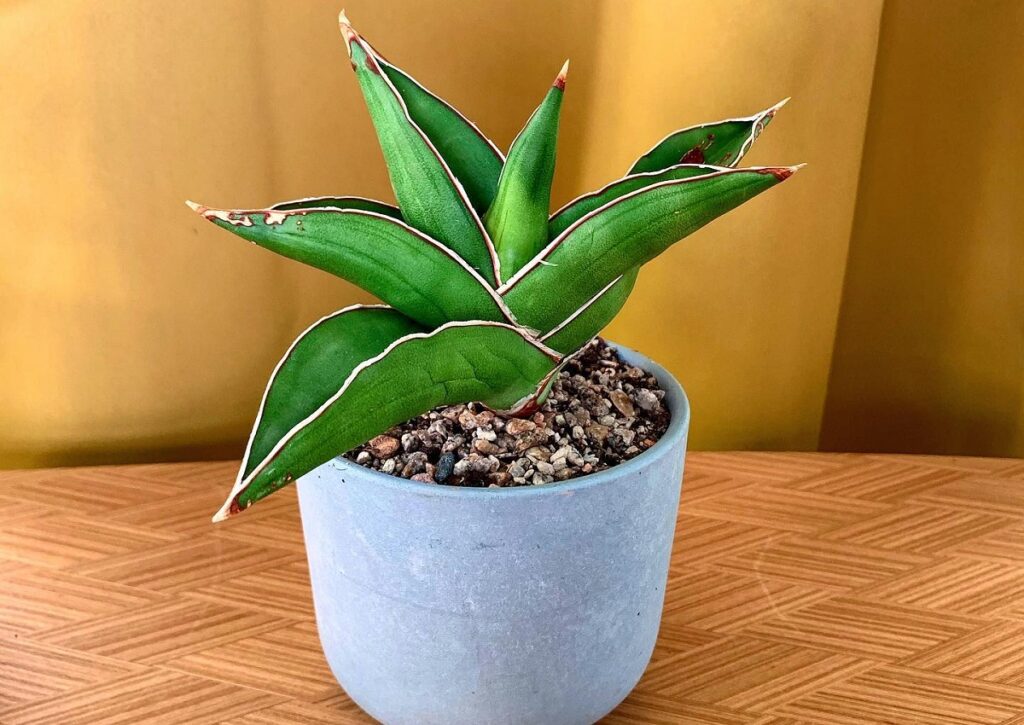
The Samurai snake plant is a compact, slow-growing variety with thick, rigid leaves that stack in a distinctive, layered formation. Its deep green color and unique shape give it an artistic, sculptural presence, making it a conversation piece in any plant collection. This variety typically reaches 6-12 inches tall, making it ideal for desktops and small spaces.
- Light: Prefers bright, indirect light but tolerates lower light levels
- Water: Drought-tolerant; allow soil to dry completely before watering
- Soil: Well-draining mix with added sand or perlite
- Temperature: 60-85°F (15-29°C)
- Humidity: Adaptable to different humidity environments
- Fertilizer: Minimal feeding with balanced nutrients in the growing season
- Pot: Small container with excellent drainage
- Propagation: Rhizome division or leaf cuttings
15. Sansevieria kirkii ‘Silver Blue’
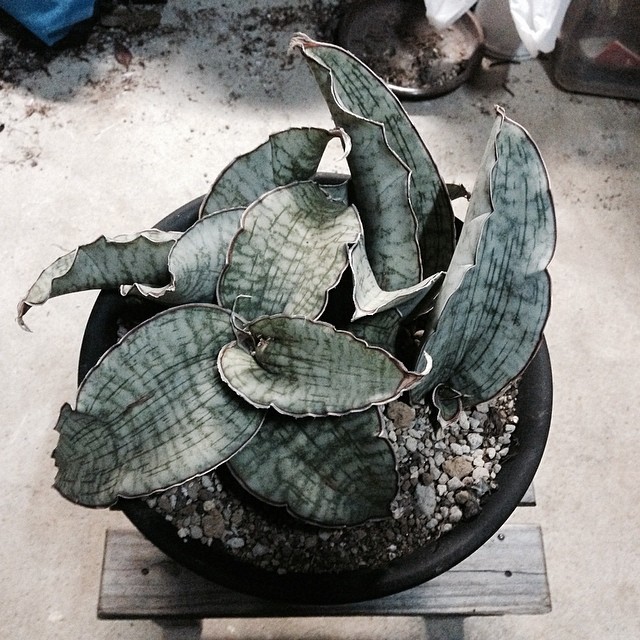
With broad, wavy leaves showcasing a silvery-blue sheen, the Silver Blue snake plant adds a touch of sophistication to any setting. Its striking foliage, combined with its low-maintenance care requirements, makes it a favorite among collectors. This variety grows in an elegant rosette formation, reaching up to 12-18 inches in height.
- Light: Best in bright, indirect light but tolerates low light
- Water: Water sparingly, allowing soil to dry completely before rehydrating
- Soil: Loose, well-draining mix with sand or perlite
- Temperature: 60-85°F (15-29°C)
- Humidity: Suitable for various humidity conditions
- Fertilizer: Occasional feeding with diluted fertilizer during growing months
- Pot: Medium container with ample drainage
- Propagation: Rhizome division or leaf cuttings
